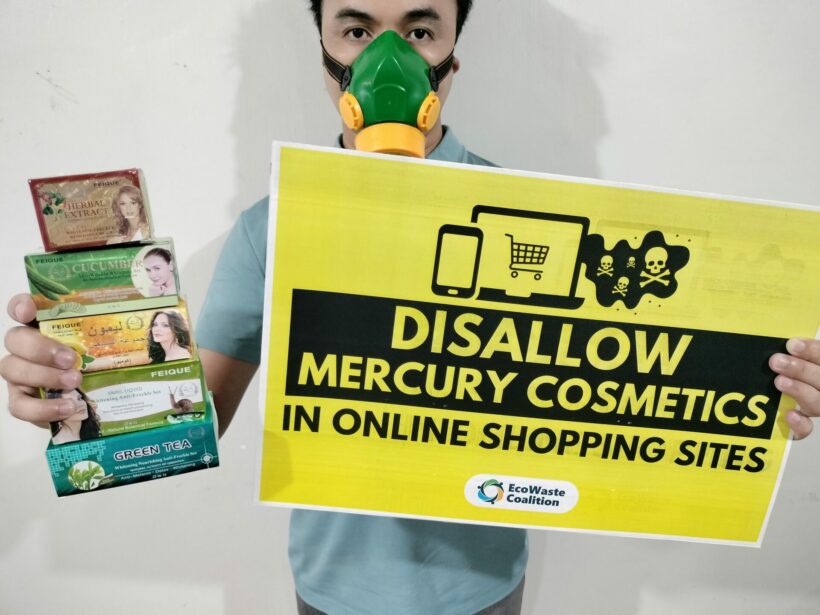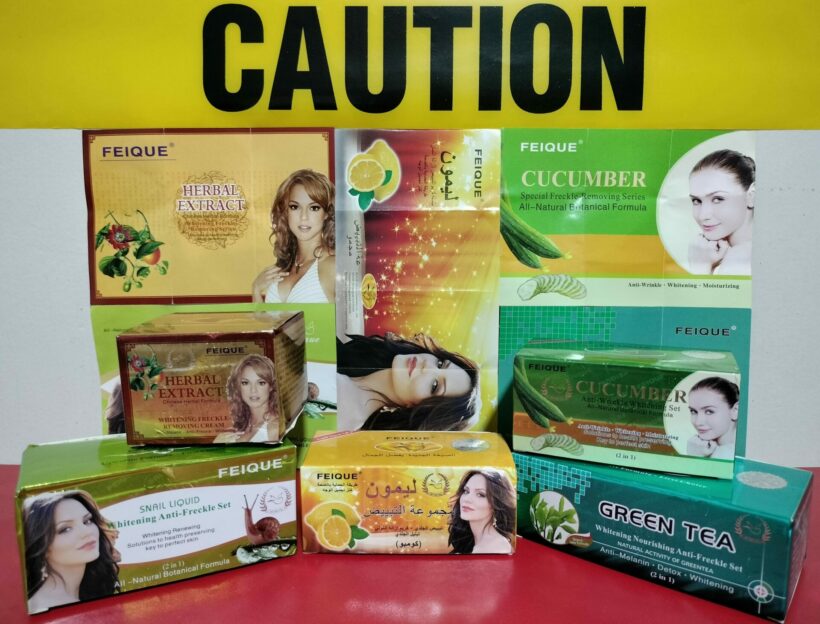Dangerous Cosmetics with Mercury Touted as “Key to Perfect Skin”
3 May 2024, Quezon City. Following its recent exposé on five Pakistan-made mercury-containing skin- lightening products sold locally, the EcoWaste Coalition today announced it also detected mercury in five China-made cosmetics procured from an online seller. To protect human health and the environment, the group asked the Food and Drug Administration (FDA) to clamp down on dealers of mercury-added cosmetics being sold online.
The toxics watchdog group made the announcement ahead of the 5.5 online shopping sales to again draw attention to the unchecked use of e-commerce sites to sell dangerous cosmetics with forbidden mercury ingredients.
“We are extremely dismayed by the unrelenting use of online shopping platforms to advertise, promote, and sell across borders skin-lightening cosmetics with high levels of mercury,” said Aileen Lucero, National Coordinator, EcoWaste Coalition. “We ask the FDA to clamp down on online sellers of these hazardous cosmetics with mercury.”
“Despite their avowed policies against prohibited and restricted items, online shopping sites are swamped with product listings for cosmetics with mercury content as if these products are legal and safe for people and the environment,” she said. “When will the online marketplace go mercury-free? If not now, when?”

EcoWaste Coalition urges online shopping platforms for the nth time to stop the illegal trade of mercury cosmetics
Lee Bell, Mercury Advisor for the International Pollutants Elimination Network (IPEN) of which the EcoWaste Coalition is a member said: “Urgent action is required by authorities in the Philippines to prevent the import of these highly toxic products through online platforms. Government action to deny these platforms online access to the Philippines should be taken if they persist in advertising these dangerous and illegal cosmetics. Pakistan and China are parties to the Minamata Convention which banned these products and they need to take enforcement action to prevent the production of these cosmetics in their own backyards. The Philippine government should rapidly instigate multilateral discussions with both countries to accelerate this action.”
For its latest test buys, the EcoWaste Coalition chose to order cosmetics from China, which like the Philippines, has set a regulatory control limit of one part per million (ppm) for mercury in cosmetic products.
Upon delivery of the parcel, the products were subjected to heavy metals screening using a portable Olympus Vanta M Series X-Ray Fluorescence (XRF) analyzer, which is capable of identifying and quantifying mercury and other elements in a sample.
As determined by the XRF device, the following products were found contaminated with mercury way above the 1 ppm limit set by China and Philippine cosmetic regulations, which will make these cosmetics illegal to produce and trade:
1. Feique Herbal Extract Whitening Freckle-Removing Cream (one jar only), 11,320 ppm
2. Feique Green Tea Whitening Nourishing Anti-Freckle Set, 4,223 ppm (day), 5,487 ppm (night)
3. Feique Cucumber Anti-Wrinkle Whitening Set, 1,333 ppm (day), 3,100 ppm (night)
4. Feique Lemon Whitening Anti-Wrinkle Face Cream Set, 311 ppm (day), 1,965 ppm (night)
5. Feique Snail Liquid Whitening Anti-Freckle Set, 8 ppm (day), 73 ppm (night)
Three of these mercury-containing products, Feique Cucumber, Feique Green Tea, and Feique Snail Liquid, are touted as the “key to perfect skin” as written on the label.
Before this, the EcoWaste Coalition had detected mercury in eight other Feique cosmetics through its market investigation from 2012 to 2022– Feique Cherry Blossoms Refining Nourishing Set, Feique Cucumber Anti-Wrinkle Whitening Set, Feique Golden Aloe Whitening Anti-Scar Anti-Freckle Set, Feique Herbal Extract Whitening Anti-Freckle Set, Feique Lavender Whitening Nourishing Anti-Freckle Set, Feique Papaya Whitening Anti-Freckle Package, Feique Rose Refining Nourishing Set, and Feique Whitening Anti-Freckle Cream.
“Mercury-containing skin lightening products are hazardous to health,” stated the World Health Organization (WHO). “Adverse health effects of the inorganic mercury contained in skin lightening creams and soaps include: kidney damage, skin rashes, skin discoloration and scarring, reduction in the skin’s resistance to bacterial and fungal infections, anxiety, depression, psychosis and peripheral neuropathy,” the WHO said.
WHO further explained: “Mercury in soaps, creams, and other cosmetic products is eventually discharged into the wastewater. The mercury then enters the environment, where it becomes methylated and can enter the food chain as highly toxic methylmercury in fish. Pregnant women who consume fish containing methylmercury can transfer the mercury to their fetuses, which can result in neurodevelopmental deficits in the children.”
Reference:
https://iris.who.int/bitstream/handle/10665/330015/WHO-CED-PHE-EPE-19.13-eng.pdf?sequence=1






